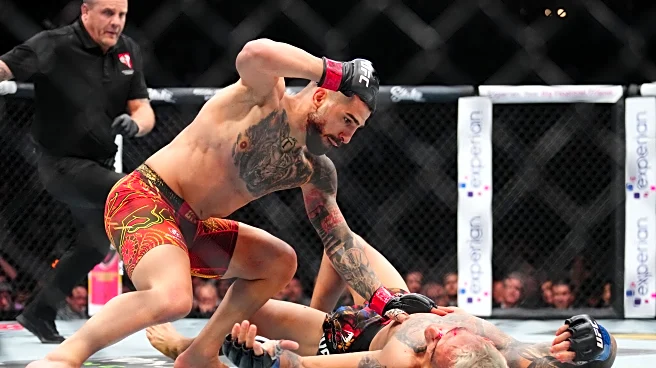What's Happening?
The New England Patriots chose not to engage in any trades during the recent NFL trade deadline, a decision that has sparked debate about the team's strategic direction. Despite holding a strong 7-2 record
and a No. 2 standing in the AFC, the Patriots opted to maintain their current roster, focusing on long-term stability rather than immediate reinforcement. This decision aligns with the team's new identity under Coach Mike Vrabel, emphasizing a 'we all we need' mentality. However, the lack of trades has been viewed by some as a missed opportunity to strengthen the defense, particularly in areas like pass rushing and secondary depth. Other teams, such as the Colts and Seahawks, made significant moves to bolster their rosters, contrasting the Patriots' approach.
Why It's Important?
The Patriots' decision not to trade could have significant implications for their season and future. By retaining their draft picks, the team is positioned to build for the long term, potentially ensuring sustained success. However, the immediate impact could be less favorable, as the team may struggle against stronger opponents without additional reinforcements. This choice reflects a broader strategy of cautious optimism, balancing current performance with future potential. The decision also highlights the competitive nature of the NFL, where teams like the Colts and Seahawks are aggressively pursuing improvements to capitalize on their current standings.
What's Next?
The Patriots will continue their season with their existing roster, facing upcoming challenges that will test their decision to avoid trades. The team will need to rely on its current players to maintain its strong performance and address any weaknesses internally. The next game against the Jets, who have made significant trades, will be a critical test of the Patriots' strategy. The outcome could influence future decisions regarding player acquisitions and team management.
Beyond the Headlines
The Patriots' inaction at the trade deadline may reflect broader trends in sports management, where teams increasingly prioritize long-term planning over short-term gains. This approach could influence other teams to reconsider their strategies, potentially leading to shifts in how NFL teams manage their rosters and draft picks. The decision also raises questions about the balance between maintaining team morale and pursuing aggressive improvements.











